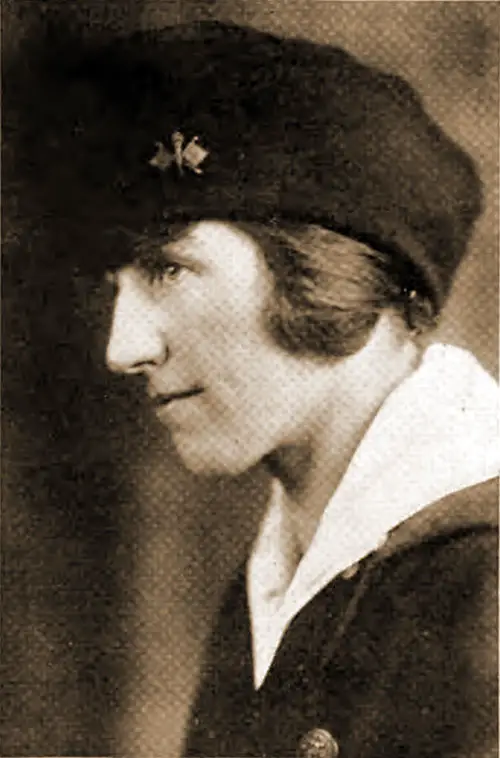How the Telephone Girls Performed in France - 1919

Celia Grimeke, a US Army Signal Corps Telephone Operator During the Great War. The Mountain States Monitor, January 1919. GGA Image ID # 192523821c
The world war found American girls associated with the American army for the first time in its history in the capacity of telephone operators. This military innovation was largely in the nature of an experiment. The American army found itself confronted with the perplexing problem of securing tele phone service in a country where prac tically none of the French operators were able to speak English.
To remedy this situation plans were gradually made for equipping the A. E. F. with American-made telephones and telephone apparatus maintained by American boys and operated largely by American girls who were able to speak French.
The first four groups of the women's telephone unit was composed largely of college girls who spoke French, French teachers and French girls employed in this country. The fifth , sixth and seventh groups were composed almost en tirely of experienced toll operators employed by the Bell telephone system.
The first appeal for volunteers was made in January, 1918. By February the first unit, composed of 33 girls, had been organized, equipped and trained in the rudiments of the telephone work, and embarked for France. The plan of or ganization called for a total of 500 oper ators to be dispatched for France in groups ranging from 30 to 60 and trained under the direct supervision of the American Telephone and Telegraph company. Pursuant to this general plan each month found a unit on its way. While Armistice Day brought joy to millions of people, sorely tried by the war, it brought tears to the eyes of the 45 operators composing the seventh unit.
Ten-forty am that day found them ready to embark. Ten-forty-one on that same eventful day found them slowly turning away from the docks homeward bound. This seventh unit had received instructions to hold themselves ready for immediate embarkation and their entire equipment was already aboard the vessel that was to carry them to glory and to France.
The women's telephone unit was under the direct control of chief signal officer Brigadier General Russell. As nearly as possible the more experienced telephone operators were assigned to the positions of chief operator and supervisors. Im mediately upon arrival in France each unit reported to Signal Corps headquarters at Tours. After an extensive train ing of several weeks they were assigned to the different exchanges. The first group were assigned to Paris and Tours. As succeeding units arrived they were ordered to the different base ports , Le Havre, Brest , Bordeaux and Saint Nazaire. Especially trained groups were assigned to the headquarters of the First and Second Armies.
All operators of the American expeditionary forces were subject to the same discipline and regulations pertaining to enlisted men and officers. Ordinarily, a day's work was limited to eight hours, although in times of emergencies and during the great offensives the work oftentimes covered a period of from fourteen to fifteen hours. This work quickly improved the knowledge of French, as the operators dealt con stantly with French operators at French exchanges and with French subscribers calling the various offices in army head quarters.
In Paris two large hotels were taken over and used for housing the ninety operators assigned to the six exchanges under the control of the signal corps . In the smaller cities , such as Neufcha teau, Langres and Chaumont, where only ten or twelve operators were stationed , a residence was used. In all cases the American telephone operators were re sponsible for their conduct to a YWCA hostess, appointed by the government, who lived with them in the hotel or private residence , as the case might be.
After the armistice was signed and the army of occupation moved into Germany two units of operators who were able to speak German were ordered to army headquarters at Trier and Coblenz. I was extremely fortunate in being as signed to the exchange at Coblenz, because it was here that I first came in contact with a number of Butte boys whom I had known for years.
These boys were members of the Second Field Signal Battalion with the First Army. They were stationed at Groshol beck, twenty-eight miles from Coblenz. Shortly after my arrival in Coblenz I was delighted to receive a visit from Horace Casey, popularly known " Bones.” The following day I had the pleasure of attending mess with the fourteen Butte boys who were members of the same company to which Mr. Casey belonged.
Although the use of the girls as telephone operators had been established in the beginning largely as an experiment, the result proved highly satisfactory. Even those army officers who had opposed the plan in the beginning were loudest in their praise after they had seen the efficient way in which the members of the women's telephone unit had performed their duty. That this branch of the service was highly important in the successful operation of all military maneuvers was shown by the fact that no expense was spared by the government in giving as good telephone service as was humanly possible.
Celia Grimeke, "How the Telephone Girls Performed in France," in The Mountain States Monitor: Denver: The Mountain States Telephone and Telegraph Company, Vol. XVI, No. 1, January 1919, p. 19.
